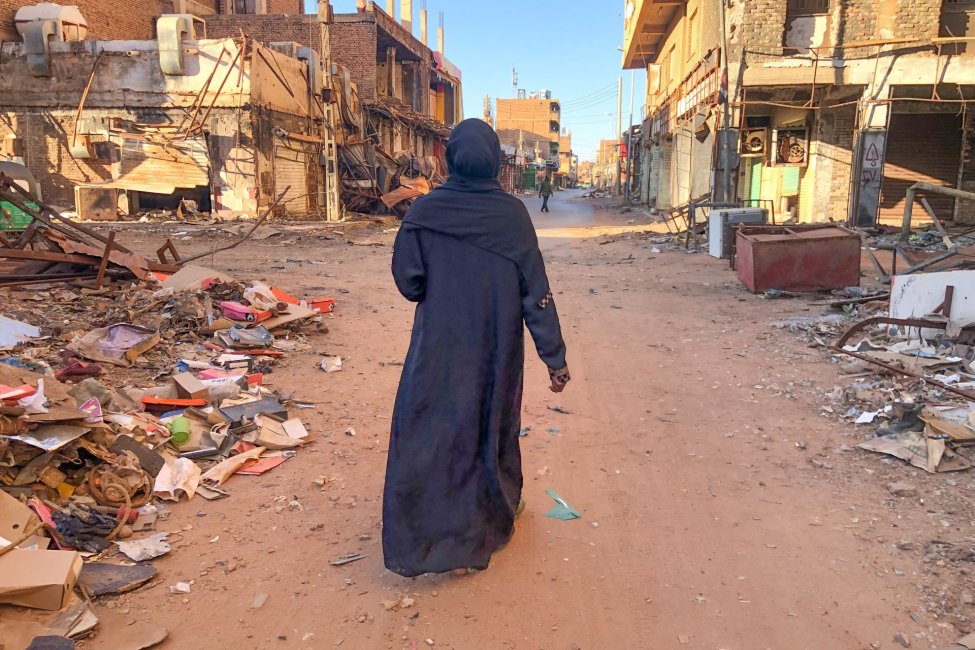
Fears Persist, but Displaced Sudanese Prefer to Leave Port Sudan
Sudan Media Forum
Hawaa Rahma, Port Sudan, July 6, 2025, Al-Alq Press Services Center — The war in Sudan continues, and security threats persist even in relatively safe states overcrowded with displaced people. Drones belonging to the Rapid Support Forces (RSF) have again appeared over Red Sea State, the country’s temporary administrative capital. Ground defenses intercepted several of them last week, causing fear and panic among displaced people in shelters and among residents of a city previously subjected to drone strikes for more than a week, which damaged strategic fuel depots and parts of the port, immediately driving up food prices.
As part of Sudan’s internal displacement crisis, Red Sea State has received about 239,000 displaced people (47,000 families), including 25,000 families living in host communities, while the remainder are housed in rented accommodations or makeshift shelters in schools.
The unstable security situation in the city has led some citizens to decide to leave Port Sudan and return to their original hometowns — a decision that is also fraught with risk.
Returns Despite Challenges
After two years of displacement, some displaced people have begun returning to cities such as Khartoum, Gezira, Sennar, White Nile, and Kordofan after the army regained control of areas previously held by the RSF.
Many displaced families have chosen to go back to their hometowns and villages despite harsh living, service, and security conditions. Every day, between 7 and 10 buses leave Port Sudan for other states. However, a citizen named Islam said she prefers to migrate abroad with her children instead of returning to Khartoum, where services are virtually nonexistent, noting that she is seeking a better future for her school-aged children.
As more people return, ticket prices from Port Sudan to other states have skyrocketed, reaching 100,000 Sudanese pounds per passenger, with half that amount charged for luggage, forcing many families to leave their belongings behind.
Displaced people report that prolonged displacement has exposed them to severe financial and psychological pressures in the absence of meaningful humanitarian assistance or relief. Those returning to their states have demanded the urgent restoration of services such as water, electricity, and police protection, fearing opportunistic criminals amid widespread weapons proliferation.
Returnees also worry about reports that RSF fighters sold weapons in local markets during their occupation of some areas, raising concerns that criminal gangs may have acquired arms for use in robbery and extortion.
Unanswered Questions for the Displaced
Displaced people living in Port Sudan’s schools or host neighborhoods still question whether conditions are truly stable back home, whether services have returned, and whether daily income opportunities exist. Since last July, some displaced families have faced official requests to vacate their temporary housing, a demand that has caused considerable hardship.
Observations indicate that most of those returning to areas reclaimed by the army are women, children, and the elderly, while many young men prefer to stay in Port Sudan for now, fearing renewed insecurity or the risk of being accused of collaboration. A young man, Ahmed Abdullah, said he is afraid to return to his city because there are no job opportunities, while he supports a family still trapped in Khartoum who depend on him financially. He noted that many young men his age were detained by the RSF and lost their lives in detention.
From another perspective, Hajjah Bakhita, over 50 years old, is afraid to end her family’s displacement in Port Sudan and return to Khartoum, fearing possible revenge attacks. “Like everyone else, we found ourselves caught up in the war and endured hardship and injustice. We never expected things to reach tribal discrimination because of a war that was not our doing,” she said. “I believe all of Sudan is our homeland, in every part of its geography. We reject war and do not support its continuation.”
Soaring Prices Strain Displaced Families
Harsh living conditions in Port Sudan have directly forced some displaced families to return home because of skyrocketing costs. A gallon of salty water now costs 1,000 Sudanese pounds, and 1,500 pounds for drinking water. Displaced people also complain about soaring fees for even minor surgeries, which can now reach billions of pounds.
Returning to Camps
Some returnees to Khartoum State have ended up back in displacement camps after being shocked by poor environmental and health conditions and the spread of disease in parts of Khartoum, especially Omdurman, which has seen a cholera outbreak, along with a lack of water, electricity, and rampant insecurity in areas like East Nile and Haj Yousif. Many have chosen to remain in camps until health and security threats ease.
Cash Crisis
The availability of jobs and cash flow remains one of the biggest challenges facing returning families. Due to overlapping problems, many cannot open bank accounts to handle financial transactions, and those returning or planning to return to Khartoum also face poor mobile phone and internet networks, which have disrupted money transfers.
According to United Nations reports, the number of internally displaced people surpassed 10 million by mid-2025, while more than 4 million have sought refuge in neighboring countries. The International Organization for Migration confirmed that over 1,189,893 internally displaced persons had returned to 20 localities across Khartoum, Gezira, and Sennar States by the end of May.
This crisis has been accompanied by social fragmentation and accusations by warring parties that civilians are collaborating with the enemy, compounded by ethnic and tribal discrimination, a breakdown of the rule of law, and a failure to deliver justice or protect civilians or restore basic services.
__
The Sudan Media Forum and its member institutions publish this material, prepared by Al-Alq Press Services Center, to reflect the humanitarian crisis and the suffering of displaced people, as well as the challenges they face in deciding whether to return to their hometowns in the absence of basic services, collapsed health and security conditions, and fears of revenge.


